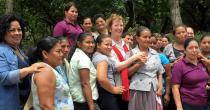Tanzania

The United Republic of Tanzania is the largest of the East African countries. 42.5 million people live in Tanzania's 947,300 km² territory. Of Tanzania's 26 regions, 21 are on the mainland and five in Zanzibar.
Tanzania has enjoyed political stability and peace since independence and also possesses a wealth of natural resources. However, these advantages have not been translated into higher standards of living for the majority of the population. Tanzania is ranked 159th on the UNDP's Human Development Index. Relatively good scores on the life expectancy, adult literacy and school enrollment indicators compensate for a low GDP per capita of $744.
The poverty reduction targets of the Millennium Development Goals are very unlikely to be met in Tanzania: Although rates of economic growth have increased since 2000, levels of poverty have remained high. 33% of the population lived below the official basic needs poverty line in 2007 – a reduction of 2.5% in the preceding 7 years. The gap between the richest and the poorest is increasing as the benefits of growth flow to the wealthier sections of society. The poorest 10% have seen their standards of living decline during the last decade. Men earn 1.7 times more than women, although this ratio has decreased in recent years.
Oxfam in Tanzania
Oxfam has been working in Tanzania since the 1960s. As of September 2011, over 60 people are a part of the team, based in five locations (Shinyanga, Morogoro, Loliondo, Arusha and Dar Es Salaam).
Livelihoods program
In Tanzania, we work to strengthen the possibilities for poor farmers to get better prices for their produce such as maize, vegetables and other newer crops such as paprika. Other projects include helping groups such as Maasai pastoralists to secure their land rights.
HIV and AIDS program
Oxfam works with seven partner organizations in Tanzania to promote awareness and to provide care and support to people living with HIV and AIDS. In addition we are also supporting other non-HIV specialist organizations to include HIV and AIDS awareness in their own workplace and communities.
Education
In 2002 the Tanzanian Government scrapped all education fees, a move influenced by the pioneering research and advocacy of our partner, Maarifa ni Ufunguo. Huge challenges remain enormous both in terms of the quantity of education – classroom sizes in some of the areas are in the region of 100 students – as well as the quality of education.










Join Oxfam International on social media: